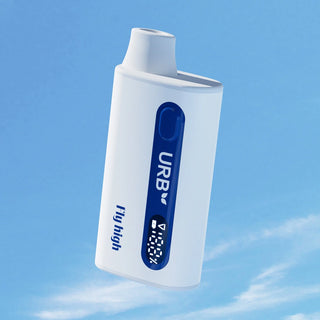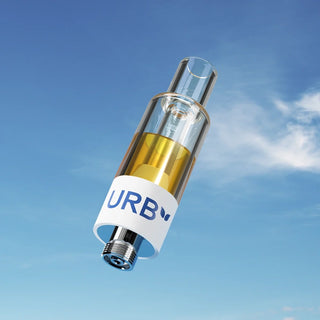A Brief Overview of the Two Compounds
HHC stands for hexahydrocannabinol, which is a naturally occurring cannabinoid found in the cannabis plant. It may potentially provide a clear-headed high.
On the other hand, Delta 8 THC is a minor cannabinoid that occurs in small amounts in cannabis plants. It's chemically similar to THC but could potentially offer a more mellow high.
Differences and Similarities
Despite their differences, both HHC and Delta 8 offer unique experiences that differ from traditional THC. HHC may provide a clear-headed high. Delta 8 potentially offers a more mellow high - perfect for those who want to unwind or simply relax. Both compounds can be used alone or combined with other cannabinoids to create custom blends.
However, there are some notable differences between the two compounds. For example, while THC is illegal under federal law across all states in America (with some exceptions), both HHC and Delta-8 occupy legal gray areas.
This means they may not be regulated as strictly as THC products in certain states but could still face restrictions or outright bans in others. Both HHC and Delta 8 offer unique benefits compared to traditional THC products but have their differences too.
Whether you’re looking for a more mellow high or a clear-headed buzz, you're sure to find something that suits your needs. The next sections will delve deeper into each compound separately, so prepare to learn more about the exciting world of HHC vs Delta 8.
What is HHC?
HHC, or Hexahydrocannabinol, is a cannabinoid that has been gaining popularity in recent years. It is a compound derived from cannabis plants and is similar in structure to other cannabinoids like THC and CBD.
Definition and Chemical Structure
HHC's chemical structure consists of a cyclohexane ring with a hydroxyl group attached to it. This makes it structurally similar to Delta-9 THC but with one less double bond. HHC interacts with the body's endocannabinoid system (ECS) just like THC does but its effects are considerably milder.
Extraction Process
HHC can be extracted from cannabis plants using various methods such as CO2 extraction or ethanol extraction. It can also be synthesized in a lab by converting other cannabinoids into HHC using chemical reactions.
Potential Drawbacks
More research needs to be done on its long-term safety before it can be fully embraced as an alternative therapeutic compound. One of the drawbacks of HHC is that it can be difficult to find in the market because it is still relatively new compared to other cannabinoids like CBD or Delta-8 THC.
Additionally, its legal status remains unclear in some states which limits its availability even further. Despite these challenges, HHC presents an interesting alternative for those seeking products with no psychoactive properties.
What is Delta 8?
Delta 8 is a natural compound that can be found in small amounts in cannabis plants. It's a close relative to the more well-known Delta 9 THC, but with some key differences.
Delta 8 has a double bond on the eighth carbon chain, whereas Delta 9 THC has it on the ninth.
Definition and Chemical Structure
The chemical name for Delta 8 is delta-8-tetrahydrocannabinol, or D8 THC for short. Its molecular formula is C21H30O2, and it has a molar mass of around 314.5 g/mol.
Extraction Process
Delta 8 can be extracted from cannabis plants using various methods, including chromatography and distillation. However, it's also possible to convert CBD into Delta 8 through a chemical process known as isomerization.
Potential Drawbacks
One potential drawback of using Delta 8 is that it may still cause psychoactive effects due to its ability to bind with CB1 receptors in the brain.
Additionally, because it's less well-known than other cannabinoids like CBD and THC, there are fewer regulations surrounding its use in products like edibles or tinctures. This means that users should exercise caution when trying new products containing Delta-8 since they may not know what they're getting into without researching first.
Comparison between HHC and Delta 8
Differences in Effects on the Body
HHC and Delta 8 THC are both psychoactive compounds with similar effects on the body, including euphoria and relaxation. However, there are several key differences between the two. One of the most significant being potency differences. By comparison, HHC is believed to have a higher potency level than Delta 8 THC.
This means that users may experience more pronounced effects with a smaller dose of HHC compared to Delta 8. Another difference is that HHC has a quicker onset time.
This means that users will feel the effects of HHC much faster compared to Delta 8 THC. However, this also means that the effects of HHC may wear off sooner than those of Delta 8 THC.
Legal Status in Different States
The legal status of both HHC and Delta 8 THC varies from state to state in the United States. As of now, there are no federal laws specifically addressing these compounds, leading to a legal grey area surrounding their production, distribution and use.
Some states have explicitly banned both compounds while others have allowed their sale under certain conditions. In some cases, only licensed dispensaries can sell these products. Other states allow them to be sold by any retailer so long as they follow certain labeling requirements.
Availability in the Market
At present, HHC is less common in comparison to Delta-8 but it's gaining popularity as it becomes more widely available in stores and online retailers. Their popularity has been driven partly by their perceived similarity to Delta 9 THC. D9 THC remains illegal at the federal level – making D8 an attractive option for people who live in states where marijuana remains prohibited. Delta 8 has been legal since December 2018 when the Farm Bill removed hemp from the Controlled Substances Act list of illegal drugs. As a result, D8 products have become widely available online and in stores across the United States.
Definition and Chemical Structure
The chemical name for Delta 8 is delta-8-tetrahydrocannabinol, or D8 THC for short. Its molecular formula is C21H30O2, and it has a molar mass of around 314.5 g/mol.
Extraction Process
Delta 8 can be extracted from cannabis plants using various methods, including chromatography and distillation. However, it's also possible to convert CBD into Delta 8 through a chemical process known as isomerization.
Potential Drawbacks
One potential drawback of using Delta 8 is that it may still cause psychoactive effects due to its ability to bind with CB1 receptors in the brain.
Additionally, because it's less well-known than other cannabinoids like CBD and THC, there are fewer regulations surrounding its use in products like edibles or tinctures. This means that users should exercise caution when trying new products containing Delta-8 since they may not know what they're getting into without researching first.
Which One Should You Choose?
Personal Preference
When it comes to choosing between HHC vs Delta 8, personal preference is a crucial factor that shouldn't be overlooked. Both compounds have distinct effects, and what works for one person might not work for another. If you're someone who prefers a more mellow high, Delta 8 items could be the better choice since it's less potent than HHC by strength comparison.
On the other hand, if you want an intense, euphoric experience, HHC items might be more suitable for you. Additionally, some people may simply prefer the taste or aroma of one compound over the other.
Legal Status in Your State
Before choosing between HHC and Delta 8 make sure to check their legal status in your state. While both compounds are federally legal under the 2018 Farm Bill as long as they contain less than 0.3% delta-9 THC (the main psychoactive component of cannabis), some states have enacted their own laws that prohibit their sale or consumption. It's important to do your research beforehand so that you don't inadvertently break any laws or put yourself at risk of legal repercussions.
Ultimately, when it comes down to making a decision between HHC and Delta 8, it's all about finding what works best for you. By considering your personal preferences, desired effects, and the legal status in your state, you'll be able to make an informed choice and enjoy a safe and enjoyable experience.
Conclusion
Recap of Key Points Discussed
Throughout this article, we explored the differences and similarities between HHC vs Delta 8. We learned that HHC is a newly discovered cannabinoid that is similar to Delta 8 but with some distinct differences.
HHC appears to be more potent than Delta 8, with a faster onset time and longer-lasting effects. However, both compounds are derived from the hemp plant and have potential benefits.
We also discussed the legal status of these two compounds and found that they are not yet widely regulated or recognized by law. While Delta 8 has gained popularity as a legal alternative to the marijuana plant in some states, it's still unclear how authorities will regulate HHC.
Final Thoughts on HHC vs Delta 8
Whether you choose HHC or Delta 8 ultimately depends on personal preference and desired effects. Both compounds have shown potential benefits. However, it's important to note that research on these cannabinoids is still in its early stages.
As the cannabis industry continues to evolve and expand, we can expect more discoveries of new cannabinoids like HHC that offer unique effects and benefits for users. In the meantime, it's up to individual consumers to do their research and make informed decisions about which products they use.
Overall, it's an exciting time for the cannabis industry as more people discover natural alternatives. As we learn more about these compounds over time, there is hope for even greater advancements through cannabis research.




